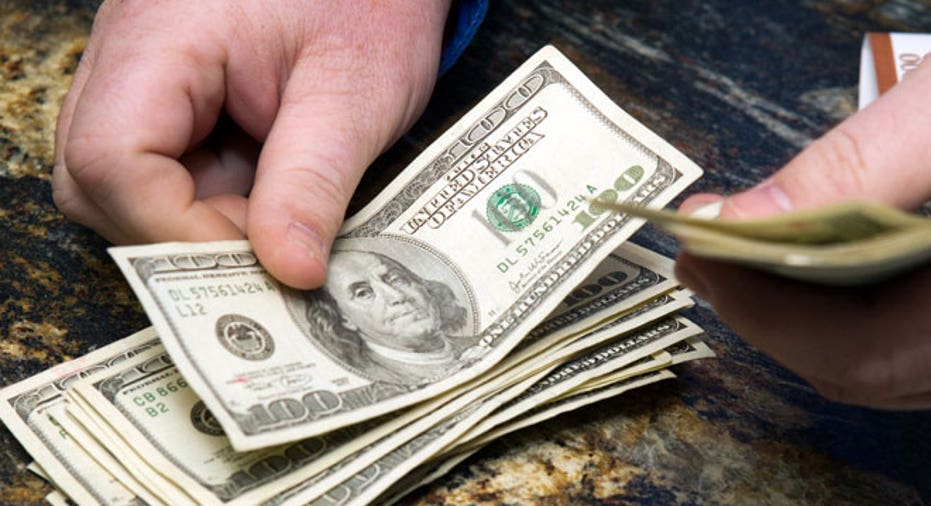Does More Money Really Bring Happiness?

What if right this moment your salary doubled in size?
Imagine the possibilities: twice as many meals out, twice as much money for retirement and twice as many weekend getaways. Or heck, maybe that beach house you’ve always wanted would now be within reach.
It’s easy to let your imagination run away with you, but would all of this bonus income add up to twice as much happiness?
While most people would respond with a resounding yes, they’d be wrong: A new study conducted by the authors of the forthcoming book “Happy Money: The Science of Spending,” proves it’s not true.
According to the study, Americans anticipated they would feel twice as happy if their salaries more than doubled. But when researchers polled participants at two different income levels, they found that people making more than twice as much were only 9% happier than those making the original amount.
More than double the salary, but less than 10% more bliss?
No, it sure doesn’t seem to add up, so let’s crunch the numbers to find out why.
The “price of happiness” has made news before—it’s how much people need to make per year to feel happy and fulfilled. According to a recent Marist poll, that magic number falls somewhere between $50,000 and $75,000.
Respondents to the poll who made more than $50,000 were more satisfied with their lives when it came to factors ranging from friends, to health, to how they spent their time. More than general lifts in salary (like getting a raise from $35,000 to $40,000, or even $60,000 to $65,000), that specific number was the happiness tipping point: “$50,000 is the mark where you start to see significant differences,” researcher Susan McCulloch told LearnVest.
So if a mega-raise isn’t necessarily the key to bliss, or you’re already making more than $50,000, what can you do to be a happier version of you?
Three Financial Habits That Lead to Happiness
It’s not surprising that we live in a culture where more is almost always seen as better: more money, more friends, more square feet in your house. But what is shocking is that the study’s authors, Michael Norton and Elizabeth Dunn, found that when it comes to spending and happiness, less is the key to success.
In fact, they identify three key factors linked to increased happiness.
1. Underindulging
Call it the effect of diminishing returns: It turns out buying less for yourself can actually make you happier. In fact, Norton and Dunn coined the term “underindulgence,” or indulging yourself less frequently than you normally would.
Basically, once you have a lot of something (say, new shoes) or engage in something frequently (like your flash sale habit), the joy you extract from each purchase lessens over time. That’s why the first bite of cake tastes way better than the 20th… you’re used to it by that point.
However, if you indulge yourself sparingly—thereby lowering your baseline spending, and increasing your joy each time you buy—you will feel happier overall. For more on this, see how to splurge right.
2. Seeking Out Experiences
The researchers also recommend investing in experiences rather than things. In other words, it’s better to cut back on clothes or electronics and save up for a vacation or spa day with friends. That’s because the money you spend will be more meaningful to you.
You can also try cutting down little spending habits, like your morning latte, and putting that money aside for a larger, more exciting splurge down the road. (See our “This or That” calculator to determine how little tweaks can lead to big savings.)
This goes hand-in-hand with learning to savor. Think about the last vacation you planned: It wasn’t just the getaway you enjoyed, it was relishing the idea that you would get away—and reliving the experience once you got home. You can do the same (for free!) by relishing the positive feelings from any good experience, whether it’s your special afternoon cup of tea or really absorbing a particular painting at a museum.
For more on how to consciously anticipate an experience, read our guide to savoring.
3. Giving to Others
As Dunn and Norton put it, “Using your money to promote underindulgence requires a shift in behavior … But another scientifically validated means of increasing the happiness you get from your money is even more radical: not using it on yourself at all.”
When their study participants were given $20 to keep or give away, the ones who gave it away felt much happier. This response appears to be universal and innate: The researchers found similar results around the world and among different ages. Even young children, notorious for being bad sharers, were happier giving away goldfish crackers than enjoying them solo.
In order to maximize your happiness, try giving in smaller amounts more frequently, rather than, say, an annual lump sum to your favorite charity, so you’ll get a spike in happiness each time. If you have trouble working giving into your budget, we can help with that.
To sum up? We think this quote from the study’s authors says it all: “What we do with our money plays a far more important role than how much money we make.”
Read More From LearnVest
The 6 Gen Y Spending Stereotypes: Which Is Yours?
Get Your Spending In Check With Free Cut Your Costs Bootcamp!



















